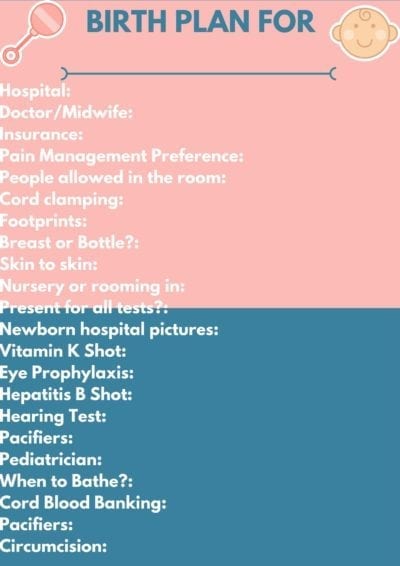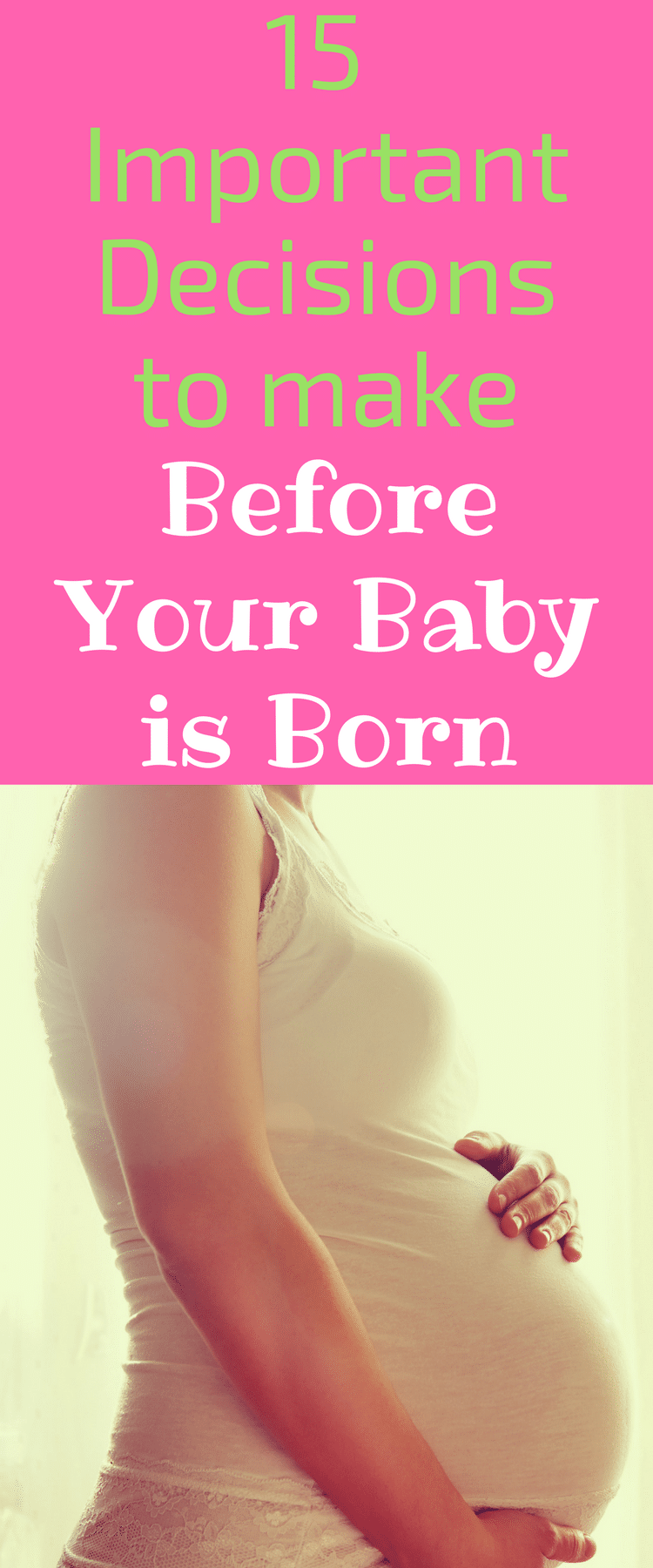Most posts contain affiliate links, which I earn a small commission from. These are provided for your convenience, and the price isn't increased at all.
15 Decisions to Make Before Baby is Born
Giving birth is a bit of a marathon – by the time you have your baby in your arms, you probably just want to feed them, snuggle them, and get a little bit of rest.
Unfortunately, while the hospital can be a great time to start your recuperation process, it’s definitely NOT a hotel. Much of the time you will spend there will involve poking and prodding both you and baby!
Since you will be pretty tired after giving birth, I think it’s important to know beforehand a little bit about what goes on directly after giving birth in the hospital. So, I thought I’d share 16 decisions you should make BEFORE your baby is born.
This post was written by me through an activation with HireInfluence on behalf of YourCareEverywhere.com. Although I received compensation for participating in the campaign, all thoughts and opinions are my own.
Join hundreds of other mamas-to-be
- Free Birth Plan and Hospital Checklist
- Helpful information to get you through pregnancy and postpartum
- Access to our FREE pregnancy and postpartum support group
When do you want the cord clamped? Who do you want to cut it?
After baby is born, the umbilical cord will be clamped in different areas and then cut – if dad is there, he will usually be given this opportunity.
While it’s becoming more common for physicians to allow the cord to stop pulsating before cutting (referred to as delayed cord clamping). There are many benefits to this, and if there are no complications, it really can be very beneficial.
Also, you should make your wishes known about who gets to cut the cord. Some doctors will just do it themselves without thinking, but most will allow your spouse or partner to do it as well. It’s kind of a rite of passage!
Skin to Skin before measurements?
When Jack was born, I didn’t even get to see him. They whisked him away to the warmer, cleaned him up, and then weighed and measured him.
I always felt a little sad that we didn’t do skin to skin right away, or that I didn’t even get to see him right after he was born.
Fortunately, skin to skin is very common now, and it’s usually recommended immediately after birth. Several of the newborn evaluations can be done at this time, and measurements – such as weight and height – can be delayed. However, I would definitely discuss this with your doctor and nurses to make sure everyone is on the same page.
And if you want baby to be nice and clean before you hold them? Not a problem! Just make sure you make those wishes known, too.
Vitamin K shot
Most newborns have lower levels of Vitamin K for a few days after birth, so this shot is important to help prevent Vitamin K deficiency bleeding. This type of bleeding can lead to disability or death, and baby is at 80 times higher risk of bleeding if they don’t have it.
If you have concerns about this shot, make sure you discuss it with your pediatrician or OB before giving birth. If you decline it, you will have to sign a form showing that you know the risks and benefits.
Eye Prophylaxis
Soon after, baby will have an antibiotic ointment applied to their eyes. Typically, erythromycin is used. You can read a little more about this procedure here.
This is done to protect baby from getting neonatal conjunctivitis that could be acquired during birth. In most states, it is required by law to be given.
Some people will decline this, though it’s important to discuss the pros and cons. Despite what some people believe, it’s not just to prevent against STDs, but also common bacterial infections found in the vaginal and anus areas.
You can request that it be done after baby breastfeeds or eats for the first time.
As with the Vitamin K, if you decline this, you will have to sign a release form stating that you know the pros and cons.

Newborn Metabolic Screenings
Baby will have a variety of tests and screenings done while staying in the hospital. These can feel annoying at times as you are trying to bond with baby, but they are important to do to make sure all is well with baby.
However, if all is well with you, you can request that you are always with baby during all tests and procedures.
Baby will get Newborn Metabolic Screenings done. These are very important, because often when a baby has a metabolic disorder, it may not show up for awhile. You will have this screening done in the hospital and then again at around two weeks. Two diseases that are tested for are PKU,
Two diseases that are tested for are PKU, hypothyroidism, and Cystic Fibrosis, all of which require immediate attention. You can read about all the newborn disorders screened for here.
I definitely do not see any reason to decline these, but you should definitely know what they are being done for!

Hepatitis B Shot
Unlike the Vitamin K shot and eye drops, this one isn’t required by law to administer. However, it often is recommended to give the first dose right after birth.
I always got it, but you should definitely talk with your physician about whether or not baby really needs it in those first few days after birth, or if it can be delayed.
Hearing test
Within the first 24 hours of giving birth, an audiologist will come by to do a hearing test for baby.
Don’t fret if baby doesn’t pass the first test – this is very common. They will just have to pass the test before they leave the hospital. There is no reason to decline this, and it will help make sure baby’s ears are working well!
Again, I don’t see any reason to decline this. But you can request that it’s all done with you!
Who your pediatrician is
At some point during your stay, you will have a visit from a pediatrician. Ideally, you will have selected a pediatrician before baby was born, and they (or someone in their practice) will come and examine baby.
I definitely do recommend finding a pediatrician before giving birth. It can prevent a lot of issues in the future. Jack was assigned a pediatrician because we didn’t have one, and let’s just say it didn’t work out very well.
If there is any cause for concern after birth, a pediatrician at the hospital will come to examine your child. Because Oliver was IUGR, he had to be examined before we were sent to Mother/Baby recovery to make sure there weren’t any underlying issues for his size (beyond the placenta).
Here are a few tips for finding a good pediatrician.
How to feed baby
I’ll admit, before Jack was born, I didn’t really think much about how I was going to feed him. They just handed him to me, said he was suckling and that I should try nursing. And that was that.
Probably not the best approach!
I think it’s important to be prepared – no matter how you choose to feed your baby. I’m a big advocate for breastfeeding– there are so many benefits for mom and baby. But I am also a big advocate for moms being able to make that decision for themselves.
Make sure you are educated on whatever method you decide to go with. Breastfeeding is best when initiated within the first hour after birth, so make sure your care team knows if that is important to you. I think that knowing as much as you can about breastfeeding before baby is born is essential. Here are a few more tips for breastfeeding a newborn, as well as breastfeeding 101 that has all the resources you need!
However, if formula is the route you want to go, make those wishes known as well so they can be prepared with bottles and formula and don’t send lactation to visit you!
Who do you want in the room?
Decide before baby is born who will be in the room during delivery. This is completely up to you! If you want to have your mom, best friend, sister, etc., that’s fine – just decide beforehand.
And if you don’t want certain people in there, make sure everyone is on the same page about that as well. The last thing you want is people trying to come in when all you want is your spouse!
If someone starts to get on your nerves and you decide you don’t actually want them there? Just let your nurse know. They can help
To Bathe or Not to Bathe
When Jack was born, they bathed him just an hour or so after birth. I had a fever, so I wasn’t able to leave with him, but Forrest went.
However, in the five years since he was born, they have moved toward waiting at least 24 hours after birth to give baby their first bath. There are different reasons for this, but it’s definitely up to you.
I recommend looking up current research on baby’s first bath and deciding when you want it done (and if you want it done in the hospital at all!).
Here is some more information on bathing your newborn.
Although cord blood banking can be expensive, it can also be life-saving down the ride. However, if you want to do cord blood banking, you do have to make arrangements for that before you give birth.
If you deliver at a “Baby Friendly” hospital, they likely won’t give your baby a pacifier. It’s done to help prevent nipple confusion, but it’s entirely in your right to decide if you want to give one right away. So make sure to bring some along if you want them!
Jack had one from birth, and he breastfed just fine. Oliver did not get one at first…but then we started going a little crazy and gave him after about three days after birth.
Circumcision
I hesitate to even put this one, simply because the mere mention of this world brings controversy. However, if you have a son, you will need to decide whether or not you plan to circumcise. It is often done in the hospital (though it typically is less expensive if you do it in the pediatrician office after birth).
No one will do this without your permission – a consent form is required before any procedure will take place.
Footprints
This might seem a little silly to mention, but if you want your baby’s footprints in their baby book, make sure to bring it with you to the hospital! We were given a little certificate with them after both our boys were born, but I kind of wish I had requested that they put them in the baby book!
For more information on navigating life with a newborn, click here.
YourCareUniverse, Inc. All rights reserved. Information from YourCareEverywhere does not provide medical advice, diagnosis, or treatment. See a certified medical professional for diagnosis and treatment. Individual treatment, diet, and exercise results may vary.

Original article and pictures take www.clarkscondensed.com site
Комментариев нет:
Отправить комментарий